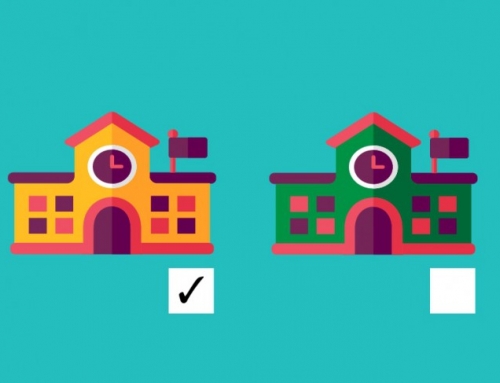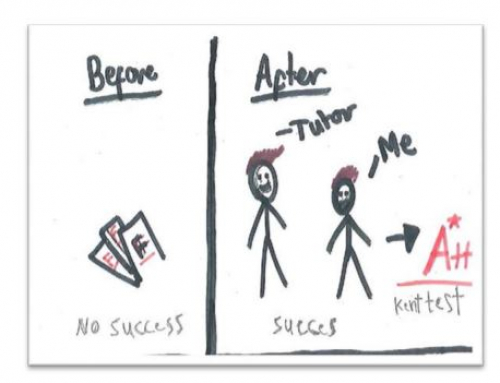A summary of some research findings
Linda Hoddle BA (Hons)
9th May 2006
Linda Hoddle, who ‘failed’ the 11 plus in 1965 gained a BA (Honours) Degree in Sociology with History: First Class, in 2002. For her degree dissertation she interviewed 14 men and women who had ‘failed’ the 11 plus over 30 years ago with the aim of exploring the possible long-term impact on their life chances and self-worth.
Her conclusions are relevant now for the hundreds of children in English schools, who continue to face the 11 plus. As she says – This study has shown that selection is part of a divisive society; wherever there is selection, there is exclusion and difference. In 2006 children continue to be demotivated and robbed of the confidence and self-esteem they need to develop to their full potential and enable them to adapt to new challenges without fear.
Did ‘failing’ the 11plus mean, for some, a lifetime of feeling secondary?
This article is a summary of research which explored the long term impact of ‘failing’ the 11plus examination. It is not written from a political standpoint, but with the experience of being an ‘11plus failure’ who is attempting to give a voice to others. The research aim was to identify whether ‘failing’ the 11plus may later in life have impeded job opportunities, affected self-esteem and perceptions of ability, regardless of any academic and professional achievements. The rights and wrongs of selection in education have been debated for over fifty years with children continuing to be the victims. It is the intention of this study to apply its findings to the continuing debate.
Drawing on data collected from interviews, I have identified common themes that unite the life experiences of 14 individuals who ‘failed’ the 11plus 35-50 years ago.
Background
Following the 1944 Education Act the 11plus was used as a means of selection for secondary education. By 1957 it was estimated that 60,000 children a year were misplaced either in grammar or secondary modern schools (Yates and Pidgeon, 1957 p.191-93). 164 grammar schools still exist within 36 Local Education Authorities. Amongst those of us who are over the age of 40 the 11plus was a pivotal event in our lives. For those who ‘failed’ the consequences were varied, for many it has had a lasting and, in some cases, a devastating effect in social and economic terms.
On average 80% of children ‘failed’ the 11plus. In the light of the current debate on selection it seems logical to look at the lives of those inflicted at such a young age with the ‘label’ ‘failure’. Was the ‘label’ accepted? Was it a motivator to ‘succeed’ or a destructive force reinforcing feelings of ‘not being good enough’?
A literature search showed that a number of writers warned of the consequences of labelling children as ‘failures’. These children are now adults and it is only right that they are able to tell their own story. If selection in education continues the grandchildren and great grandchildren of these adults will be telling similar stories.
Research Findings
The key themes which emerged:
(1) Expectations and lack of them to pass the 11plus
(2) Poor Self-Perception and Low Self-Esteem
(3) Self-Validation and Over-Compensation
(4) Fear and Self-Doubt
(5) View of ‘Others’ and their View of You.
(6) Exclusion and Difference
It became clear that the central, linking theme was Exclusion and Difference.
Expectations and lack of them to pass the 11plus
Expectations of passing the 11plus were varied and poor self-esteem did not necessarily suddenly develop after ‘failing’. For some the process began much earlier as streaming from the age of seven often predicted whether a child would ‘pass’ or ‘fail’.
Most interviewees felt some form of pressure to ‘pass’. Sarah received extra maths tuition and recalled, “If you didn’t go to grammar school you wasn’t really worth knowing”. Carol’s mother was anxious that she should go to the local girls’ grammar school. Preparation for this involved tuition in verbal reasoning and maths plus regular visits to an educational psychologist who assessed her IQ at 130.
Being disappointed for their parents was common amongst most interviewees.
Laura: My disappointment was that I had ‘failed’ them. I think that was the word ‘FAILED’.
Jane: Because we all love our parents … you feel somehow that you have let them down by not being the selected one and not allowing them to be the selected one’s parent.
Paul: I felt that this pressure to achieve this vague goal [had] gone, but at the same time I felt that I’d let everybody down, I wasn’t in the same league as my sister. I’d not lived up to my father’s expectations.
Exclusion and Difference
To “divide is to exclude” (Plummer, 2000 p.21) and “exclusion had connotations of inferiority, inclusion of superiority” (ibid p.152). ‘Failing’ the 11plus was bad enough, but being separated from friends and peers who were thought to be equals reinforced feelings of poor self-perception and low self-esteem.
Lesley: My friend that I’ve grown up with since we were three, she ‘passed’ and I ‘failed’ and she went on to the grammar school and I went on to the secondary modern school. And that was the beginning of really feeling something was different. We were like sisters being ripped apart.
Laura: So many of my friends went to the grammar school and I never saw them again. So it broke up [friendships] because there was a looking down on – well I’ve passed for grammar school and you haven’t.
Warren: I had some friends who I had to catch the bus with to junior school … And it seemed strange that I’d always assumed that they were the same as me really. And then it became clear that they weren’t, they were cleverer than me.
Jane: I can remember thinking, you take the 11plus … and then in the September some of the girls have gone to grammar school and the rest of us didn’t, when you meet up with them you automatically assume that they are better than you. Even after a day or two that they have been chosen and they are above you and you are below them.
Intellectual frustration and an awareness of limited opportunities have heightened feelings of exclusion and difference leading to low self-esteem.
Don: You were being schooled for a specific place in life rather than a good all round education …I always felt you were taught on a need to know basis, if you didn’t need to know they wouldn’t teach you … We were taught to be … sort of [factory] fodder.
Bill: I left [at 16] to do an apprenticeship as a hairdresser. So whether my expectations were not very high because I hadn’t passed my 11plus and gone to a not very academic school, I think that is probably the reason.
As Bill became older he could no longer see himself as a hairdresser, “it’s a young person’s game”. As the main breadwinner he was not in a position to study full time to widen his opportunities.
Bill: The Open University has been my salvation because if I hadn’t been able to do a degreelike that I wouldn’t have made much progress.
Inadequate qualifications in the workplace added to feelings of inferiority and exclusion for others.
Laura: If you haven’t got qualifications you’ve got this thing hanging over you that you’re not good enough. Qualification, that’s it really … I have to learn to deal with it and remind myself, – you’re wrong. But it won’t go away, won’t naturally go away … It’s an inferiority complex in thinking that you are not as good as someone with an education. But there’s still that door that I won’t ever be able to get through and the older you get, then age is against you as well.
Self-Validation and Over-Compensation
In order to achieve a degree of self-worth, self-validation in some form became essential for most interviewees.
Daphne: I thought I had only been put where I deserved to be [secondary modern school] but then you come up against people and wonder why these people have more than you, because technically they are not as intelligent as you. Whether they scraped through the 11plus and sat back on their laurels … yet the likes of us have had to fight for what we wanted.
Self-validation for others came through a struggle for educational qualifications. The majority of interviewees have shown great strength of character to “prove them wrong”.
Nine interviewees studied for various qualifications as mature students. Qualifications ranged from ‘O’ Levels to a Masters Degree and in each case this has been a major achievement in overcoming practical and personal obstacles. Obtaining or studying for a degree has increased the self-esteem of some. In the 1980s Bill was teaching without a degree or teaching certificate, consequently he was paid as a classroom assistant. This made him feel like a “second-class citizen”. He now has an Open University degree and PGCE.
Bill: I found the degree very difficult initially … but my confidence grew and I found I was able to contribute to discussions and make valid comments on all aspects of the courses … There was a tremendous feeling of achievement after I’d completed the degree and I felt that I was on the same level as many of my colleagues. I felt more confident and my self-esteem was dramatically increased and I considered that I was making a major contribution to the work.
Don: When I first got there [college] I had a massive inferiority complex … that night I went for the first time, the nerves virtually robbed me of the strength to get there … They all seemed that much more intelligent when they started speaking … I thought God what a moron, all these others are so articulate … I don’t think I spoke for the rest of that year … Over the years you sort of did well and your confidence grows … I sort of join in with a discussion now without even bothering.
However, does gaining a degree mean that ‘11plus failures’ feel that they now ‘belong’? Jane’s experience casts doubt on this; she studied for an Open University degree and trained for three years as a podiatrist but she does not have the self-confidence to practice.
Jane: Whilst I’m completely confident with the clinical decisions I’ve made, I’m not confident with carrying them through … I somehow feel that I’m not entitled to make these decisions … and that somehow or other I’m bluffing above what I should be doing … That I should perhaps be the foot care assistant not the chiropodist. Because this is what the girls who ‘passed’ [the 11plus] would be doing not the ones who ‘failed’ would be doing.
Jane viewed mature students, like herself, as “gate crashing the academic area”, impostors in a world to which they will never belong. This cultural clash was something that Don and Sandra were also aware of. Both feel it is too late for their degrees to open up opportunities for them.
Don: You’ve got a postman studying for a degree or somebody, a housewife. ‘They’ think, I’ve got a degree; they’re going to have one as well … ‘They’ think it devalues theirs a bit.
Sandra: I feel like a second-class citizen when I speak to the lecturers … Especially, I think they are more impressed with people who are more educated … I’ve got this feeling that theuniversity had to take so many poorly educated people.
Fear and Self-Doubt
Time and time again during interviews tendencies were expressed towards over-preparation of work, perfectionism and obsessional traits.
Carol: I think it’s fundamental self-doubt, I mean it’s taken me until August to start this piece of writing for my MA which I ought to have started probably in May, and why because I was actually frightened to start writing it. I got a distinction in the last module, why should I be scared? The inner terror of failure has got much bigger.
Warren: I like to think I’m conscientious. I often agonise about things I’m not doing or should be doing … It’s actually quite nice, like yesterday when I went out on a course and discover that I’m doing 10 times more than most people.
Fear of failure and self-doubt stimulate contrasting reactions. For example Helen will put herself into competitive situations, whilst Alice and Paul have developed coping mechanisms to protect themselves.
Helen: I think why am I doing it? I have to prove to myself the whole time that I am capable of something – of achieving something. I look back across my life and I feel I haven’t achieved anything really.
Alice: I deliberately make myself different, that way I cannot be compared like for like. Give me an essay to write or forms to fill in … I change all the questions to the way I want to answer them … I do my own thing.
Paul: I’m a born coward I used to avoid competitions or confrontations in which my weakness would be shown up … So I’ve tended to shape my life around my own limited expectations.
Poor Self-perception and Low Self-esteem
It is particularly difficult for some ‘11plus failures’ to believe in their own academic or professional success. There seems to be a basic denial of their intelligence, often regarding the ‘other’ as cleverer and therefore superior to themselves.
Carol: Occasionally people pay you a compliment and say “Oh yes she’s clever”. And I actually always think are you being sincere about that? … and basically that I’m not very clever, although I’d like to be clever … I will always doubt the compliment, you know never accepted it.
Helen: Every year we come up with these good grades and every year I think it’s because X [did] this or Y [did] that. I never think that’s me. It’s very difficult when it comes to having any self-esteem when it comes to anything intellectually demanding.
Warren: I’m not a very confident person. I tend to assume most people are brighter than me, I assume I’m a little slower than most.
View of ‘Others’ and their View of You
The relationship that children had with their teachers appears to have a particular bearing on how, as adults they react to figures who have an air of authority, socially or at work. For example, Lesley feels intimidated and inferior with teachers she meets on a social level and as clients in her work as a hairdresser. Jane will avoid confrontation or conflict with any authority figures.
Jane: I have this feeling that they are articulate and can quickly think on their feet … and have the moral high ground that I will never have because they have this cloak of authority.
Helen: I always feel on edge when talking to people who are bright and well educated because I always think they have the upper hand and I only get by.
I have learnt that ‘failing’ the 11plus can be a bonding experience. Some people are proud to say they ‘failed’ to show that they’ve beaten the system and succeeded. Others are comforted to know there are people who have been equally affected by their ‘failure’.
Warren: I’ve always been very proud of the fact that I’m an ‘11plus failure’. I have an immediate affinity with anyone else I meet that is in the same position.
Carol: When H told me her story … I was conscious as I was listening to her of having enormous empathy. My initial reaction was surprise because I assumed that she had ‘passed’. I was interested to hear what she had to say … I thought, yes I know exactly where you are coming from. Actually what that does is make you feel closer to those people. It makes you feel a kind of warmth for them in the sense that it makes you feel you have had a similar experience … it was a supportive conversation … quite healing.
All the above, varied responses give evidence to the fact that ‘11plus’ was and still is a significant event in their lives. The distress that some interviewees showed whilst reliving their experiences demonstrated the extent to which they have internalised their ‘failure’ and suppressed the emotions attached it.
What is particularly striking is how closely statements of their early experiences of the 11plus, match evidence gathered from recent research: The Impact of the Structure of Secondary Education in Slough (Schagen and Schagen, 2001b) and The Effects of the Selective System of Secondary Education in Northern Ireland (Gallagher and Smyth, 2000). The big difference being that in the case of the interviewees these are 35-50 year old memories.
Conclusion
This study has attempted to answer the question, did ‘failing’ the 11plus mean, for some, a lifetime of feeling secondary? It has shown the influence that ‘failing’ the 11plus can have on people’s lives. As Carol describes so well:
Whilst it, as an event, in a sense is less immediate and it’s gone away … the waves spreading out from the ripples that it created are still very much there … This is an old wound and most people tend to leave old wounds alone, they may walk with a limp, but they’ve got used to it … even though it has all sorts of ramifications in their present lives.
For the majority of the interviewees ‘failing’ the 11plus was an event that created feelings of inferiority. For others it reinforced the belief that they were secondary. In each case they were fed a negative image of their abilities and their ‘failure’ was personalised (Plummer, 2000 p.23). Many struggled to combat negative self-perception and increase their job opportunities through higher education and adult learning, but evidence shows that this did not necessarily heal the long-term damage to their self-worth.
This study has shown that selection is part of a divisive society; wherever there is selection, there is exclusion and difference. In 2006 children continue to be demotivated and robbed of the confidence and self-esteem they need to develop to their full potential and enable them to adapt to new challenges without fear. Intense competition to gain places at popular secondary schools produces anxiety and bitter disappointment among children and parents. The more emphasis that is placed upon selection and assessment in schools the more we come to accept that the measured level of our academic ability defines who we are. It is hardly surprising therefore that there is such a strong relationship between our educational experience and our self-worth.
To close I can do no better than to quote Laura:
So passing an exam at 11 you’re being recognised by your parents, teachers, by your peers and by the school that is going to take you. Somebody has actually recognised you, that okay, whatever the description is, you’re bright or … but you’re worth it and of course the folk that don’t [pass], that’s the message that says, “Sorry you’re not worth us putting any more investment in”. That’s what it says. Of course you don’t know that when you’re 11 but that’s what it’s saying, you’re not worth investing in.
References
Gallagher, T and Smyth, A. (2000) Department of Education for Northern Ireland. The effects of the Selective System of Secondary Education in Northern Ireland Bangor: DENI. Available from: http//www.deni.gov.uk/parstu/selectionresearch/sel6. [Accessed 12 June 2001]
Plummer, G. (2000) Failing working-class girls, Staffordshire: Trentham Books.
Schagen, I and Schagen, S. (2001b) The Impact of the Structure of Secondary Education in Slough.
NFER [online] Available from: http://www.nfer.ac.uk/research/downloads/slsfinalreport.doc [Accessed 28 February 2002].
Yates, A and Pidgeon D.A, (1957) Admission to Grammar Schools. London: National Federation for Educational Research (NFER).





